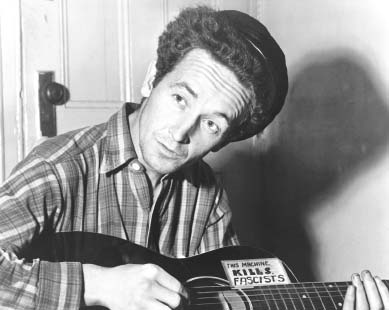
When he joined members of Vampire Weekend on stage in Iowa in January 2016 to sing ‘This Land Is Your Land’, Bernie Sanders (mercifully off-mic) was following in a long political tradition. The Vermont senator might be surprised to learn, however, that Woody Guthrie’s song – widely regarded as an alternative national anthem for the US – has been co-opted by Republicans as well as Democrats since the bard of the Great Depression first put pen to paper in February 1940. George HW Bush employed it for his 1988 campaign, and its patriotic poetry (‘I saw below me that golden valley’, etc.) was deemed sufficiently freedom-loving for inclusion in cold-war school songbooks.
Right-wingers, though, gloss over the verses berating ‘private property’ and bemoaning the queues outside ‘the relief office’. On the political left, the song has been cherished, from George McGovern citing it in 1972 to Bruce Springsteen and an 89-year-old Pete Seeger playing it at the 2009 Obama inaugural celebration. (They sang the less revolutionary variant about ‘No trespassing’. Sanders just stuck to the poetry.)
Guthrie wrote the lyrics in response to Irving Berlin’s nationalistic schmaltz ‘God Bless America’, as sung in 1938 by Kate Smith, the first lady of radio, while storm clouds brewed in Europe. The initial chorus, ‘God blessed America for me’, soon morphed into ‘This land was made for you and me’. Guthrie set the words to a tune derived from the Carter Family’s ‘When the World’s on Fire’ (itself based on the Baptist hymn ‘Oh, My Loving Brother’) and their similar number, ‘Little Darlin’ Pal of Mine’. He recorded it in 1944 for Folkways but it was not released until 1951, minus the part knocking private property. Guthrie’s acetate with this contentious section was only rediscovered in 1997.
The song has been covered by artists from the Kingston Trio to Johnny Cash. Its oppositional attitude makes it the granddaddy of all protest songs, an inspiration to singers from Bob Dylan to Tracy Chapman. YouTube footage from 1985 has the Boss introducing it as ‘the greatest song ever written about America … [it] gets right to the heart of the promise of what our country was supposed to be about’.
Yet it took Native American Henry Crow Dog to point out its colonial overtones. When the Lakota Sioux chief told Pete Seeger in 1968 that ‘this land belongs to me’, the veteran folkie was so abashed that he commissioned another verse from the indigenous perspective: ‘This land was stole by you from me’.

A staple of the Farm Aid benefit concerts, the song has enjoyed plenty of exposure in the twenty-first century. The retro-soul group Sharon Jones & the Dap-Kings did a startlingly brassy rendition for their 2005 album Naturally; in 2012, Neil Young and Crazy Horse included a gloriously ragged one on their Americana album. Possibly the most successful recent reworking is by My Morning Jacket, their twangy then squally guitars underpinning Jim James’s mellifluous vocal on a 2014 commercial for an adventure clothing brand that also raised money for conservation.
Given its canonical status and contested legacy – as Robert Santelli writes in This Land Is Your Land: Woody Guthrie and the Journey of an American Song, ‘No other American standard at the same time praises and dissents, celebrates and castigates, loves and warns’ – parodies were inevitable. The most notorious broadside came in 2004 when the Californian animators JibJab had a satirical dig at both Dubya and John Kerry (‘This land will surely vote for me’). From the resulting legal scrum it emerged that the copyright on ‘This Land’, or at least a version of it, may have lapsed in 1973. In which case, fittingly, this song really is ‘for you and me’.
Richard Clayton